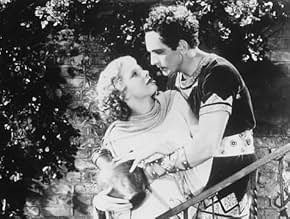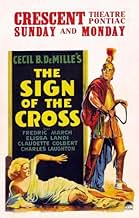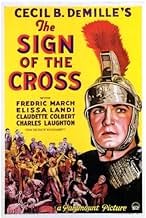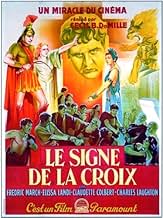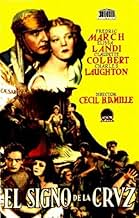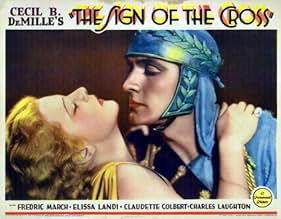AVALIAÇÃO DA IMDb
6,8/10
2,9 mil
SUA AVALIAÇÃO
Nero envia para arena os Cristãos, mas nunca contaria que Marcus intercederia por dois deles que seriam enviados para o sacrifício. Tudo porque se apaixonou por Mercia, filha de um dos que l... Ler tudoNero envia para arena os Cristãos, mas nunca contaria que Marcus intercederia por dois deles que seriam enviados para o sacrifício. Tudo porque se apaixonou por Mercia, filha de um dos que lutariam na arena.Nero envia para arena os Cristãos, mas nunca contaria que Marcus intercederia por dois deles que seriam enviados para o sacrifício. Tudo porque se apaixonou por Mercia, filha de um dos que lutariam na arena.
- Direção
- Roteiristas
- Artistas
- Indicado a 1 Oscar
- 3 vitórias e 1 indicação no total
Joyzelle Joyner
- Ancaria
- (as Joyzelle)
Robert Seiter
- Philodemus
- (as Robert Manning)
Avaliações em destaque
My favorite DeMille film. Charles Laughton and Claudette Colbert are delicious as the debauched emperor and empress of Rome. Prominent supporting players Arthur Hohl and Harry Beresford appeared in two horror classics (ISLAND OF LOST SOULS and DOCTOR X, respectively) the very same year. John Carradine can be seen as a condemned Christian on his way to the arena (you can also hear his voice as a spectator and as a gladiator). Very sharp viewers can also spot Dave O'Brien (a condemned Christian) and Kent Taylor (a disinterested spectator). Three famous scenes still impress today: Poppaea's milk bath; Ancaria's attempted lesbian seduction of Mercia; the outrageous arena sequence featuring beheadings, burnings, impalements, hungry crocodiles, untamed apes, bears, tigers and, of course, lions. Only C.B. could have gotten away with this in 1932! The closing cast list includes the characters Viturius, Servillius and Philodemus, but I'm not sure who they are. Viturius may have been Marcus' soldier-aide, although he doesn't look as burly as Richard Alexander. The other two must be Strabo's ugly, brutish companion and the old Christian man protective of the little orphan girl.
Yikes! De Mille's erotic raunchy graphic and splendid SIGN OF THE CROSS made at Paramount in 1932, and his first talkie bible study is a movie you not forget. It is infamous and famous for many sights and other comments here will give you the reaction to the graphic cruelty of the truly shocking Arena/Gladiator scenes. The ridiculously entertaining asses milk bath with nipples ahoy and Claudette's milky breasts, the very funny dialog of daily life amid the splendor, the horror of the rape and torture of a teenage Christian boy, the eerie similarity to the 1932 German persecution of the European Jews, the depression era parable of the idle rich uncaring at the financial death of the 1930s masses, the dazzling costumes (no bras in Rome either), the claustrophobic street sets with rushing horses and fights in corners, all in all create an amazing action tableau like a pencil sketch bible book drawing brought to life. The film's art direction and set design and costumes are especially evocative of 'a silent epic with sound' and one easily can transfer the idea of seeing the 1925 BEN HUR with sound as SIGN OF THE CROSS favorably compares. The Arena montage scenes are really shocking. The Moon Dance is outrageous lesbian swankiness and gorgeous as all hell... well pagan hell as depicted by the morally austere Demille. Great moving wallpaper for your next party if played on a big TV and without sound with your CD collection going instead. If you agree that SIGN OF THE CROSS made in 1932 is really a 1920s silent film with dialog, have a look at FOLLOW THRU made two years earlier in 1929 and in color and as jazz modern today in it's creative style. CROSS plays like an ancient movie but FOLLOW THRU still plays new.
Great old DeMille flick about the persecution of Christians in ancient Rome. The movie starts with Emperor Nero (Charles Laughton) laughing and playing music while Rome burns. When someone reminds him that the people might hold Nero responsible, he quickly decides to blame the unpopular believers of the new Christian religion. As Christians are being rounded up and killed, Roman prefect Marcus (Fredric March) falls in love with a Christian girl (Elissa Landi). This doesn't sit well with Empress Poppaea (Claudette Colbert), who's in love with Marcus, and she conspires to have the girl arrested.
Charles Laughton gives an outrageously hammy performance and I loved every second of it. I wish he had been in the film a lot more. Fredric March is good, as always. Lovely Elissa Landi does an admirable job in probably her biggest role but she's eclipsed by Claudette Colbert. What this film is perhaps most famous for is the scene where Colbert takes a bath in donkey milk, in which we see quite a bit of what God gave Ms. Colbert to work with. She's a beautiful woman and it's a very sexy scene. The sets and costumes are great, as one expects from a Cecil B. DeMille picture. It's just a really good film, entertaining and dramatic, with some provocative bits of sex and violence that will surely please pre-Code fans. If for no other reason, see it for Colbert.
Charles Laughton gives an outrageously hammy performance and I loved every second of it. I wish he had been in the film a lot more. Fredric March is good, as always. Lovely Elissa Landi does an admirable job in probably her biggest role but she's eclipsed by Claudette Colbert. What this film is perhaps most famous for is the scene where Colbert takes a bath in donkey milk, in which we see quite a bit of what God gave Ms. Colbert to work with. She's a beautiful woman and it's a very sexy scene. The sets and costumes are great, as one expects from a Cecil B. DeMille picture. It's just a really good film, entertaining and dramatic, with some provocative bits of sex and violence that will surely please pre-Code fans. If for no other reason, see it for Colbert.
Believe it or not some sort of code did exist during the pre-Code era but no one felt obliged to follow it. Although lapped up by audiences the excesses on display in this extraordinary opus proved too much to bear in certain quarters and undeniably hastened the formation of the Hays Code and the crackpot Catholic League of Decency. One would hazard a guess that it is not so much the unspeakable cruelty depicted here that caused such moral outrage but the skimpy costumes and the hip-swivelling cooch dance by Joyzelle Joyner with its distinctly lesbian overtones.
Piety and Paganism are in direct opposition here and although Mr. De Mille is seen to be on the side of the angels he is astutely aware of the box office potential of depravity and debauchery.
What should really concern an objective cinéphile is how well-made the film is and how well it has held up over nine decades. The cinematography is lustrous courtesy of Karl Struss, one of the greatest pictorialists in the history of cinema whilst Mitchell Leisen's art and costume design is exemplary. The plot is not entirely original of course as the play by Wilson Barratt from which it is taken had been strongly influenced by the novel 'Quo Vadis?' of Henryk Sienkiewicz. Here the ill-fated lovers are played by Fredric March and Elissa Landi, both of whom do their very best in one-dimensional roles. The classy Miss Landi's portrayal is virtuous without being self-righteous and her anguished cry: "Dear Christ, why?" really touches the heart. A relatively small amount of screen time is allotted to Charles Laughton and Claudette Colbert as Nero and Poppaea but they certainly make the most of it. Miss Colbert is utterly bewitching here and supremely sensuous which makes her the obvious choice to play Cleopatra for the same director two years later. Apparently de Mille was perplexed by the idiosyncratic Mr. Laughton and gave up trying to direct him. Left to his own devices his performance is touched by genius and we are obliged to film historian David Thomson for describing Laughton's interpretation as 'the most flagrant and fleshy portrait of an abandoned homosexual spirit seen in a Hollywood film until that time.'
Although not for the faint hearted this piece is arguably Cecil B. De Mille's finest achievement.
Piety and Paganism are in direct opposition here and although Mr. De Mille is seen to be on the side of the angels he is astutely aware of the box office potential of depravity and debauchery.
What should really concern an objective cinéphile is how well-made the film is and how well it has held up over nine decades. The cinematography is lustrous courtesy of Karl Struss, one of the greatest pictorialists in the history of cinema whilst Mitchell Leisen's art and costume design is exemplary. The plot is not entirely original of course as the play by Wilson Barratt from which it is taken had been strongly influenced by the novel 'Quo Vadis?' of Henryk Sienkiewicz. Here the ill-fated lovers are played by Fredric March and Elissa Landi, both of whom do their very best in one-dimensional roles. The classy Miss Landi's portrayal is virtuous without being self-righteous and her anguished cry: "Dear Christ, why?" really touches the heart. A relatively small amount of screen time is allotted to Charles Laughton and Claudette Colbert as Nero and Poppaea but they certainly make the most of it. Miss Colbert is utterly bewitching here and supremely sensuous which makes her the obvious choice to play Cleopatra for the same director two years later. Apparently de Mille was perplexed by the idiosyncratic Mr. Laughton and gave up trying to direct him. Left to his own devices his performance is touched by genius and we are obliged to film historian David Thomson for describing Laughton's interpretation as 'the most flagrant and fleshy portrait of an abandoned homosexual spirit seen in a Hollywood film until that time.'
Although not for the faint hearted this piece is arguably Cecil B. De Mille's finest achievement.
Cecil B. DeMille was famous for the excesses he depicted on screen, and "The Sign of the Cross" has enough excess for a dozen movies by any other director. Fortunately, DeMille loved to detail the debauchery that warranted divine punishment, because he was more adept and entertaining when portraying orgies than he was when depicting piety. Perhaps sin is intrinsically more interesting than virtue. Certainly the sinful characters, especially Charles Laughton as Nero and Claudette Colbert as Poppaea, are riveting and colorfully conceived. Laughton lolls around on his divans, while alluring slave boys attend to his whims. Colbert lures and tempts lovers when not catering to her bare flesh in a milk bath. Bloody gladiatorial games and the obligatory feeding Christians to the wild beasts keep the proceedings on track, and an erotic Lesbian dance enlivens an otherwise dragging orgiastic gathering. Orgies can be difficult to film because the delights are far more evident to participants than they are to viewers. Perhaps every orgy needs a Lesbian dance.
Unfortunately, DeMille felt compelled to throw away screen time on a group of early Christians, whose idea of a good time was to sit on rocks, sing tuneless songs, and listen to a motivational speaker. Naturally, the improbably named Marcus Superbus, played by Frederic March in a fetching mini-skirt and tight curls, falls in love with Mercia, a bland, but virginal, Elissa Landi, and he rejects the advances of the milky, silky Claudette Colbert, who had been around the Colosseum a few times. Of course, March not only rejects Colbert, but risks losing the endless parties and his own rising career for the touch of Landi's soft hand. "The Sign of the Cross" is hardly convincing drama despite the lure of Romans sinning every way, everywhere, and with everybody.
If the corny dialog and stilted scenes of pious proceedings had been severely cut and Laughton's and Colbert's roles had been brought to center focus, the film would have been a delicious camp spectacle. However, as the film now plays, viewers must patiently wait out the dull-as-drying-paint scenes with Landi and company to savor the sinful delights of Nero and Poppaea, which make "The Sign of the Cross" worth a look and a hoot or two.
Unfortunately, DeMille felt compelled to throw away screen time on a group of early Christians, whose idea of a good time was to sit on rocks, sing tuneless songs, and listen to a motivational speaker. Naturally, the improbably named Marcus Superbus, played by Frederic March in a fetching mini-skirt and tight curls, falls in love with Mercia, a bland, but virginal, Elissa Landi, and he rejects the advances of the milky, silky Claudette Colbert, who had been around the Colosseum a few times. Of course, March not only rejects Colbert, but risks losing the endless parties and his own rising career for the touch of Landi's soft hand. "The Sign of the Cross" is hardly convincing drama despite the lure of Romans sinning every way, everywhere, and with everybody.
If the corny dialog and stilted scenes of pious proceedings had been severely cut and Laughton's and Colbert's roles had been brought to center focus, the film would have been a delicious camp spectacle. However, as the film now plays, viewers must patiently wait out the dull-as-drying-paint scenes with Landi and company to savor the sinful delights of Nero and Poppaea, which make "The Sign of the Cross" worth a look and a hoot or two.
Você sabia?
- CuriosidadesCecil B. DeMille was pressured to drop Ancaria's seductive dance in the orgy scene by Will H. Hays of the Hays Office, but DeMille adamantly refused. Still, censors often cut out gruesome parts of the film, particularly, the cart carrying dead bodies out of the arena, a gorilla dancing around a semi-nude girl, elephants stomping Christians and picking them up with their tusks, crocodiles about to eat a bound girl, etc. These scenes are all in the restored version.
- Erros de gravaçãoWe see a woman tied up in the Coliseum as crocodiles are set loose on her. They are clearly alligators (broad snout), which were unknown to Europeans until Columbus's time, 15 centuries later. Only two countries have alligators: The United States and China.The Romans never went to either place.
- Versões alternativasRe-released in 1944, with some cuts (sex and sadism scenes) and preceded by a nine minute prologue, set in present time with a WWII theme. This re-release version runs 118 minutes.
- ConexõesEdited into Through the Centuries (1933)
- Trilhas sonorasChristian Hymn No.1
(1932) (uncredited)
Music and Lyrics by Rudolph G. Kopp
Sung a cappella by Christians at the meeting
Reprised by them after their capture and at the arena
Sung a cappella by Elissa Landi and Tommy Conlon
Played and sung offscreen at the end
Principais escolhas
Faça login para avaliar e ver a lista de recomendações personalizadas
- How long is The Sign of the Cross?Fornecido pela Alexa
Detalhes
Bilheteria
- Faturamento bruto nos EUA e Canadá
- US$ 5.971.004
- Tempo de duração
- 2 h 5 min(125 min)
- Cor
- Proporção
- 1.37 : 1
Contribua para esta página
Sugerir uma alteração ou adicionar conteúdo ausente

